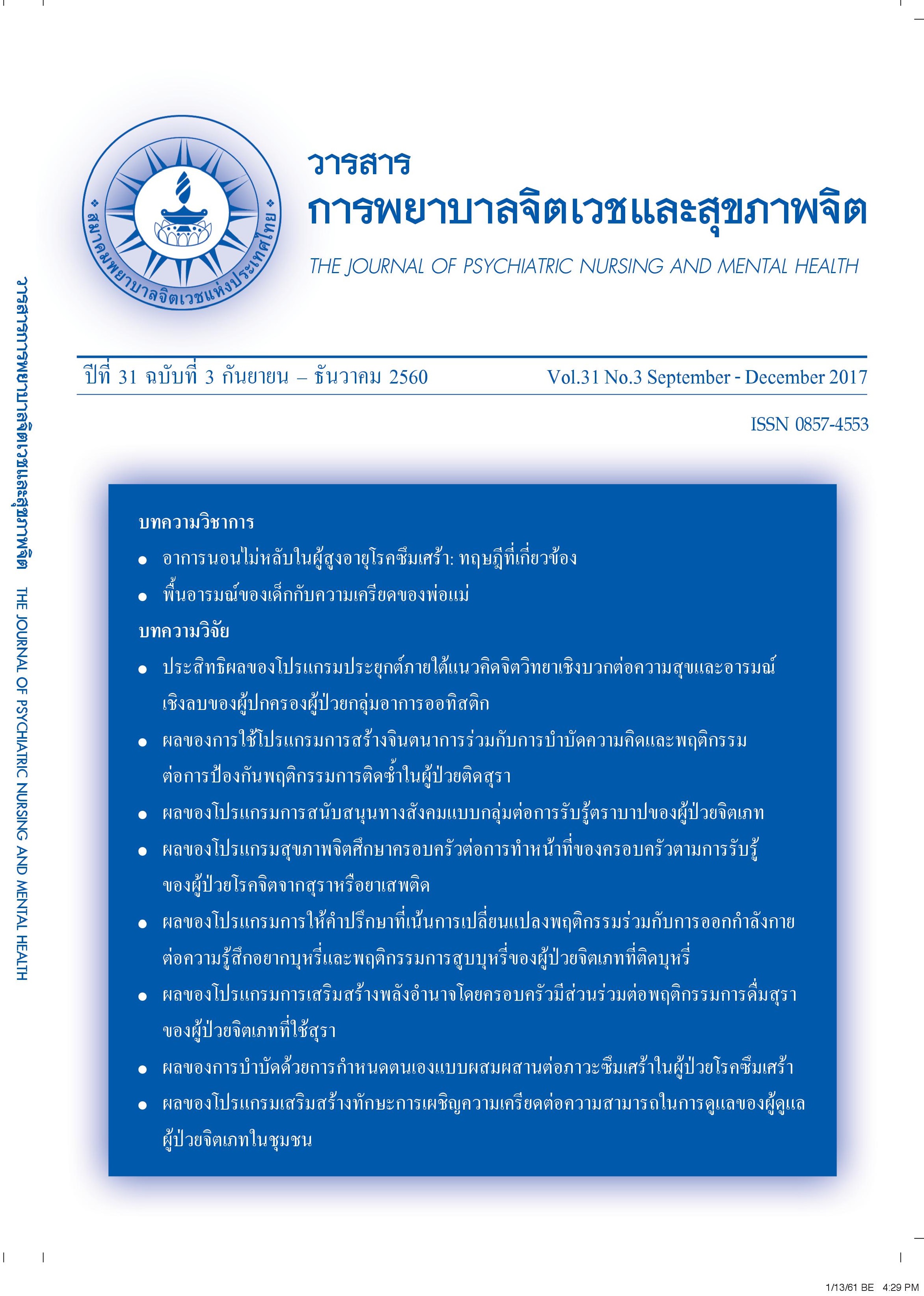พื้นอารมณ์ของเด็กกับความเครียดของพ่อแม่
Main Article Content
บทคัดย่อ
บทคัดย่อ
พื้นอารมณ์เด็กเป็นลักษณะที่บ่งบอกว่าเด็กแต่ละคนมีแนวโน้มที่จะตอบสนองต่อสิ่งแวดล้อมรอบตัวอย่างไร หากเด็กมีพื้นอารมณ์ที่เข้ากันได้กับสิ่งแวดล้อมของเขา จะช่วยลดความเครียดของเด็ก นอกจากนี้พื้นอารมณ์ของเด็กยังส่งผลต่อความคิด อารมณ์ และพฤติกรรมการเลี้ยงดูของพ่อแม่ การที่พ่อแม่มีความรู้เกี่ยวกับพื้นอารมณ์ของเด็กจะช่วยให้พ่อแม่เข้าใจวิธีการตอบสนองต่อสิ่งแวดล้อมของเด็ก และสามารถปรับสิ่งแวดล้อมให้เหมาะสม กับลักษณะพื้นอารมณ์ของลูก ซึ่งจะเป็นการลดสิ่งที่ก่อความเครียดให้เด็ก และยังช่วยลดความเครียดในการเลี้ยงดูของพ่อแม่และเป็นการส่งเสริมปฏิสัมพันธ์ที่ดีระหว่างพ่อแม่และลูก
บทความนี้มีวัตถุประสงค์เพื่อแสดงถึงความสำคัญของพื้นอารมณ์ของเด็ก ผลกระทบของพื้นอารมณ์ของเด็กต่อความเครียดในการเลี้ยงดูของพ่อแม่ และความสอดคล้องกันระหว่างลักษณะพื้นอารมณ์ของเด็กกับลักษณะของพ่อแม่
Article Details
บทความที่ได้รับการตีพิมพ์แล้ว เป็นลิขสิทธิ์ของสมาคมพยาบาลจิตเวชแห่งประเทศไทย
เอกสารอ้างอิง
Arellano, P. A. E., Harvey, E. A., & Thakar, D. A. (2012). A longitudinal study of the relation between depression and parenting. Family Relations, 61, 271-282. doi:10.1111/j.1741-3729.2011.00694.x
Callender, K. A., Olson, S. L., Choe, D. E., & Sameroff, A. J. (2012). The effects of parental depressive symptoms, appraisals, and physical punishment on later child externalizing behavior. Journal of Abnormal Child Psychology, 40(3), 471-483. doi:10.1007/s10802-011-9572-9
Chess, S., & Thomas, A. (1991). Temperament and the Concept of Goodness of Fit. In J. Strelau & A. Angleitner, (Eds.), Explorations in Temperament International Perspectives on Theory and Measurement (pp. 15-27). New York: Springer Science + Business Media.
Coplan, R. J., Bowker, A., & Cooper, S. M. (2003). Parenting daily hassles, child temperament, and social adjustment in preschool. Early Childhood Research Quarterly, 18, 376-395. doi:10.1016/S0885-2006(03)00045-0
Ekathikhomkit, N., Sitthimongkol, Y., Prasopkittikun, T., Phuphaibul, R., & Orathai, P. (2016). Influences of mothers’ stressors, maternal depression and parenting on conduct problems among Thai preschoolers. Pacific Rim International Journal of Nursing Research. 20(3), 210-224.
Hanington, L. Ramchandani, P., & Stein, A. (2010). Parental depression and child temperament: Assessing child to parent effects in a longitudinal population study. Infant & Behavior Development, 33(1), 88-95.
Kiff, C. J., Lengua, L. J., & Zalewski, M. (2011). Nature and nurturing: Parenting in the context of child temperament. Clinical Child and Family Psychology Review, 14, 251-301. doi:10.1007/s10567-011-0093-4
Kornienko, D. S. (2016). Child temperament and mother’s personality as a predictors of maternal relation to child. Procedia - Social and Behavioral Sciences, 233, 343-347. doi: 10.1016/ j.sbspro. 2016. 10.148
Lengua, L. J., & Kovacs, E. A. (2005). Bidirectional associations between temperament and parenting and the prediction of adjustment problems in middle childhood. Applied Developmental Psychology, 26, 21-38. doi:10.1016/ j.appdev.2004.10.001
McBride, B. A., Schoppe, S. J., & Rane, T. R., (2002). Child characteristics, parenting stress, and parental involvement: Fathers versus mothers. Journal of Marriage and Family, 64, 998-1011.
McClowry, S. G., Rodriguez, E. T., & Koslowitz, R. (2008). Temperament-based intervention: Re-examining Goodness of Fit. European Journal of Developmental Science, 2, 120-135.
Mäntymaa M., Puura K., Luoma I., Salmelin R. K., &Tamminen, T. (2006). Mother’s early perception of her infant’s difficult temperament, parenting stress and early mother-infant interaction. Nordic Journal of Psychiatry, 60, 379-386. doi: 10.1080/08039480600937280
Newland R. P., & Crnic, K. A. (2017). Developmental risk and goodness of fit in the mother child relationship: Links to parenting stress and children’s behavior problems. Infant and Child Development, 26, 1-18. doi: 10.1002/icd.1980
Östberg, M., & Hagekull, B. (2000). A structural modeling approach to the understanding of parenting stress. Journal of Clinical Child Psychology, 29(4), 615-625.
Rantanen, J., Tillemann, K., Metsäpelto, R, Kokko, K. &Pulkkinen, L. (2015). Longitudinal study on reciprocity between personality traits and parenting stress. International Journal of Behavioral Development, 39(1), 65-76. doi:10.1177/
0165025414548776
Rothbart, M. K. (1991). Temperament, Development, and Personality. Retrieved April 14, 2016 from https://www.researchgate. net/publication/289915844_Temperament
Seifer, R., Dickstein, S., Parade, S., Hayden, L. C., Magee, K. D. &Schiller, M. (2014). Mothers’ appraisal of goodness of fit and children’s social development. International Journal of Behavioral Development, 38(1), 86-97. doi:10.1177/
0165025413507172
Stoltzfus, J., & Karraker, K. (2009). Goodness of fit between parenting style and child temperament: Special with slow- to warm-up infants. In P. H. Krause & T. M. Dailey, (Eds.), Handbook of Parenting: Styles, Stresses and Strategies (pp. 87-110). New York: Nova Science Publishers.
Super, C. M., Axia, G., Harkness, S., Welles-Nyström, B., Zylicz, P. O., Parmar, P., et al. (2008). Culture, temperament, and the“Difficult Child”: A study in seven western cultures. European Journal of Developmental Science, 2, 136-157.
Thomas, A., Chess, S., & Birch, H. (1970). The origin of personality. Retrieved November 17, 2011, from https://www.acamedia.info/sciences/sciliterature/origin_of_personality.htm


